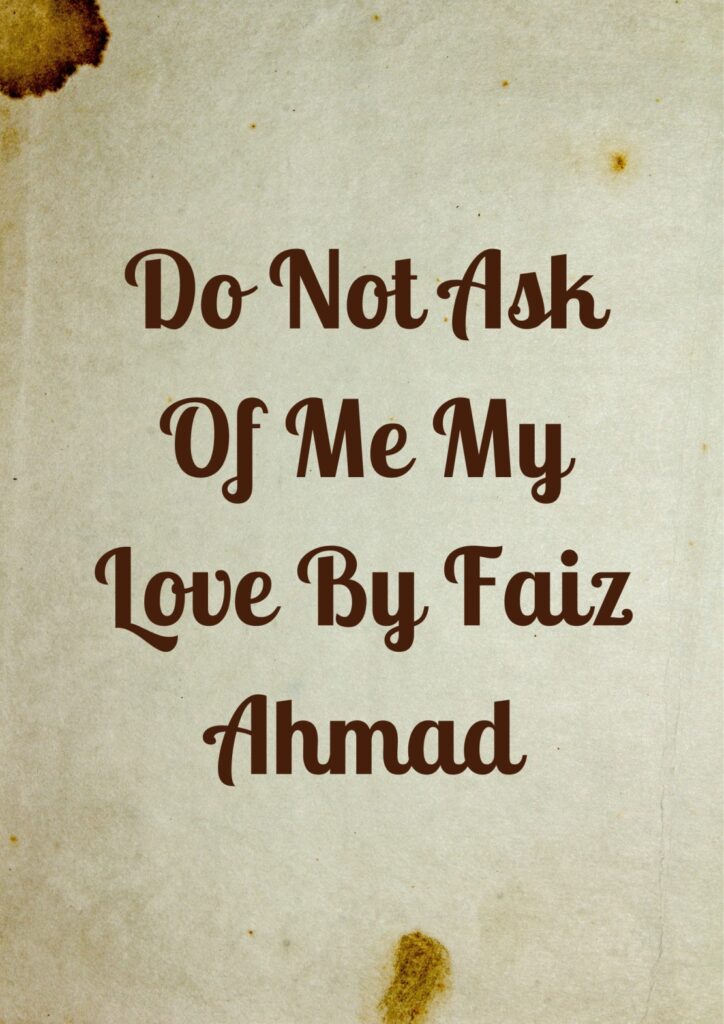Explore the summary of Do Not Ask of Me, My Love by Faiz Ahmad Faiz, a powerful Urdu poem reflecting lost love, emotional conflict, and the harsh realities of society.
Do Not Ask Of Me, My Love Summary By Faiz Ahmad

BUY FAIZ AHAMAD FAIZ’S FAMOUS BOOKS ON AMAZON
Summary of Do Not Ask Of Me My Love By Faiz Ahmad
Introduction
Faiz Ahmad Faiz is considered one of the most prominent and sensitive poets of Urdu literature. His poem “Do Not Ask of Me, My Love” (Mujhse pehli-si mohabbat mere mehboob na maang) is a revolutionary love poem, which turns from personal love to social reality.
This poem stands on the triangle of love, compassion and social consciousness — where the lover is first immersed in his love, but when he sees the suffering, exploitation and injustice of the society, his vision changes.
Beginning of the poem – Call of a passionate lover
At the beginning of the poem, Faiz says to his beloved:
“Mujhse pehli-si mohabbat mere mehboob na maang…”
This line is an emotional rejection. Faiz admits that earlier he was completely immersed in his love – his beloved’s face, eyes, lips, and beauty seemed like the whole world to him.
He explains that at that time he felt that this love was the essence of life – that this is the only world, this is the truth.
Awakening to Reality
But now Faiz’s eyes have opened. He has now seen the reality – hunger, helplessness, disease, slavery, exploitation, and injustice. Now he has seen the poor, the oppressed, and the suffering whose lives are immersed in darkness.
He says:
“Ab aur bhi dukh hain duniya mein mohabbat ke siwa…”
This is the most poignant and thought-provoking line of the poem, which shows that when a sensitive human being becomes aware of the suffering of society, his attention is not limited to personal love alone.
Love versus Social Suffering
For Faiz, love is not an ordinary emotion. Through this poem, he wants to say that the boundaries of love are broken when inequality, exploitation and injustice are spread in the world.
Now he does not find the same peace in the eyes of his beloved, because he now considers those eyes to be the reflection of the eyes of all the victims.
This feeling of his indicates that:
“The depth of personal love seems incomplete when collective pain dominates.”
A revolutionary viewpoint
Faiz is not just a lover, but also a revolutionary thinker. He believes that being entangled only in personal love is a kind of narcissism. As long as there is injustice in society, love cannot be complete.
That is why he urges his beloved:
“Now do not ask for the same love from me as before – because now I have changed.”
This change is not a negative change, but the result of awareness and sensitivity.
Structure and symbols of the poem
The language of the poem is simple, emotional, and full of mysterious symbols. Faiz has infused a conscious and rebellious tone with the beauty of Urdu.
Main symbols
Eyes, lips, face – symbols of the traditional beauty of love
Sick body, burnt face – inequality and suffering prevalent in the society
Moon, night, light – symbols of hope, love and change
Main message
Love is not only personal, but also social.
When there is injustice in the society, then love is also incomplete.
An aware person does not abandon love, but expands it.
The purpose of art and poetry is not only beauty, but change.
Importance from the teaching point of view (for Class 11)
The poem teaches students that poetry is not only about beauty or love, but it also has social consciousness.
Faiz’s composition inspires them to become sensitive, aware and thoughtful people.
This chapter helps to understand the importance of progressive writing in Hindi and Urdu literature.
Analysis and Criticism
Many critics believe that this poem is an important example of the progressive movement. This work highlights the socio-political situation of the time when poverty, partition and class struggle were at their peak in India and Pakistan.
This poem of Faiz does not deny love, but takes it out of the self-centered approach and connects it with public concerns.
✅ Conclusion
“Do Not Ask of Me, My Love” is a poem that touches the heart, but does not stop there. It shakes the thought and forces the reader to think whether love is life alone, or is love meaningful only when we consider the pain of others as our own?
This poem of Faiz is the story of the expansion of love – where love is not limited to only two people, but wants to embrace the entire humanity.